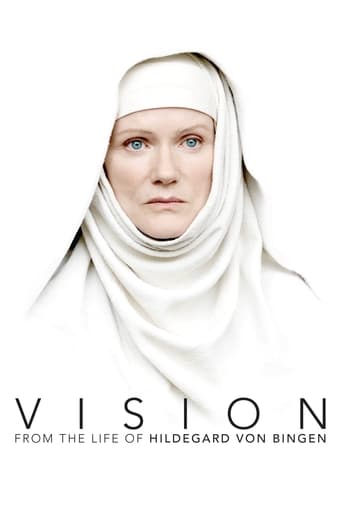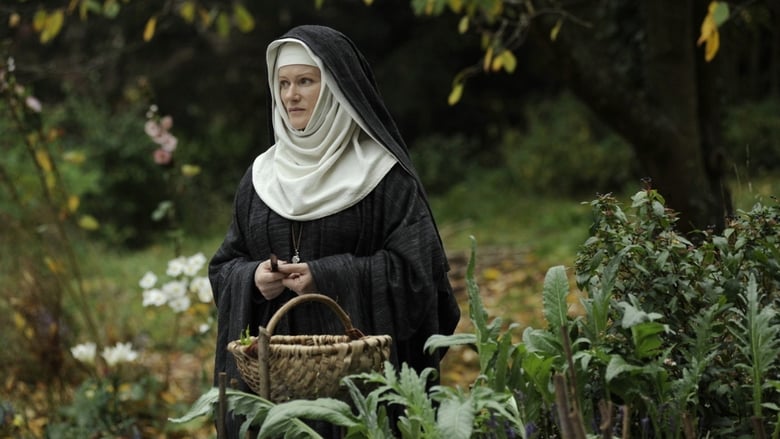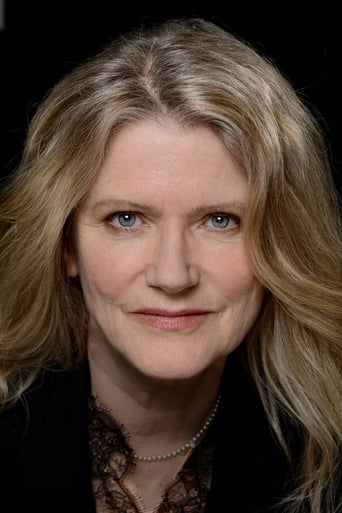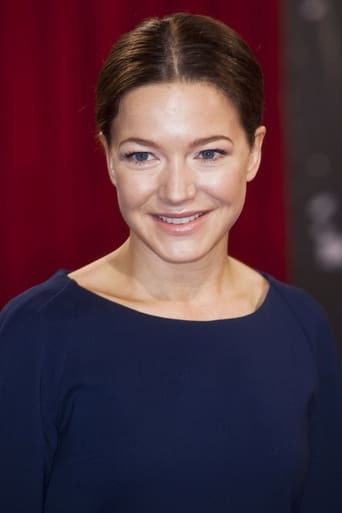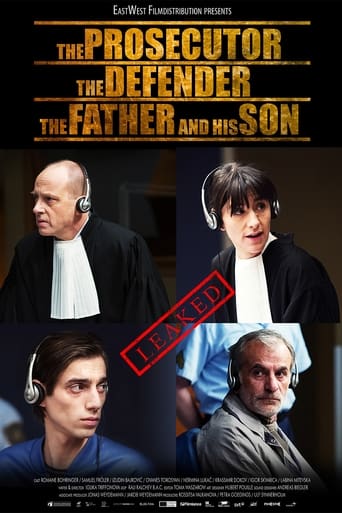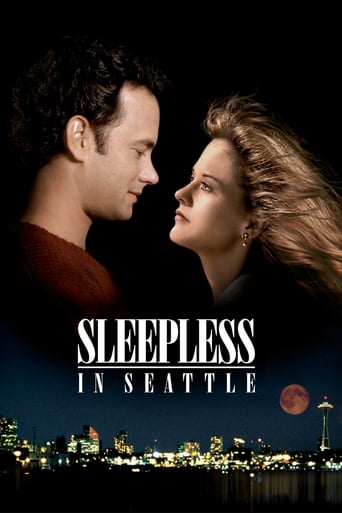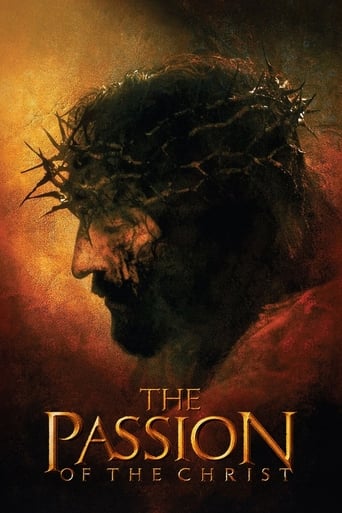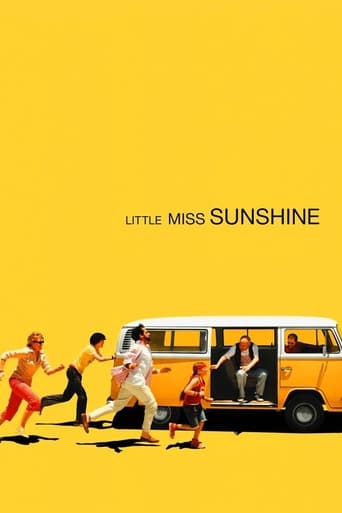Vision – From the Life of Hildegard von Bingen (2009)
Hildegard von Bingen was truly a woman ahead of her time. A visionary in every sense of the word, this famed 12th-century Benedictine nun was a Christian mystic, composer, philosopher, playwright, poet, naturalist, scientist, physician, herbalist and ecological activist.
Watch Trailer
Cast
Similar titles


Reviews
Entertaining from beginning to end, it maintains the spirit of the franchise while establishing it's own seal with a fun cast
There's no way I can possibly love it entirely but I just think its ridiculously bad, but enjoyable at the same time.
Like the great film, it's made with a great deal of visible affection both in front of and behind the camera.
It's simply great fun, a winsome film and an occasionally over-the-top luxury fantasy that never flags.
beautiful. in profound sense. for the recreation of atmosphere. for the acting. for the different perspectives about a delicate subject, for the delicate force of image. for the image of a woman against her period expectation who wins and gives a nuanced definition to the sainthood. it is a film who propose more than gives. it propose the reflection about society from the XII century and from today. it propose an useful example of courage. and a not ordinary expression of the faith. a film who propose many questions and who rediscover an impressive figure of Middle Age who change the perspective about her time.Barbara Sukowa propose a Hildegard von Bingen who becomes heroic step by step, scene by scene, in a precise and convincing style.
Independent German film was for decades the mainstay of the European cinematography. Brave, original thinking and the courage of the expression made it a breath of fresh air for the movie lovers. Unfortunately these days are long gone. Almost everybody tries so hard to be hip and Hollywoodlike. If we explode few things and simplify the plot for every simpleton, how can we miss? Well, we miss time and time again. The eternal beauty of filmmaking is about trying and having an idea, and a story to tell. It seems that there are no stories left to tell, or there are no people left who like the stories to be told to them." Vision" is a strange, unfinished movie, but it is an honest attempt to feel and think, and that is all one needs in this art form.
Sometimes I muse: what if I woke up and found myself in the middle of the 12th century in Western Europe? What was life really like? The present film centering on one of the most "uppity" women of the Middle Ages, Hildegard von Bingen, takes you into the medieval world as few films do. As much as we often like to idealize the Middle Ages, particularly since the 19th century, the period was anything but ideal. Unlike today, people had few rights, and the powers-that-be could uplift or destroy almost at a whim. In the church, people with power used threats of persecution, usually in the name of heresy or blasphemy, which could result in excommunication and even execution as a means to reign people into modes of behavior which fit their desires and designs. Hildegard von Bingen was one of the few people who stood up to these forces and refused to bow to unreasonable demands easily.Hildegard was remarkable because she was a woman who challenged predominantly male authority during an age when women wielded very little political influence outside of noble circles. Some queens did have some authority in political realms, but an abbess of a monastery making requests and even demands of bishops and other nobles was almost unheard of. An abbess had authority within her cloister but rarely outside. Typically abbesses were expected to be completely obedient to the local abbot and bishop, following their orders without question on bended knee. But Hildegard was not afraid to vocalize her desires and even her frustrations in front of very powerful forces. She is famous for having visions and claiming communication with God, an assertion which infuriates the local church leaders, who contest that such claims are an insult to the prophets of scripture. Why should God single her out and give her insight not given to bona fide holy people of the Bible? However, she wins favor with one of the bishops who allows her dialogs to be transcribed. Another aspect of Vision, like Name of the Rose, concerns the beautiful medieval books.The 12th century was markedly different from modern society today but I think there were aspects more similar than we like to acknowledge. If we take a peak behind the curtain of castles and cathedrals, we see the same human desires and weaknesses we all share, which I think is one of the points of Vision. A large part of the film involves Hildegard's attachment to a young novice nun, Richardis, and the relationship becomes closer than even one of mother and daughter. Unfortunately, political and ecclesiastical power threatens the relationship, and not even Hildegard has enough influence to stop it.The present film is a wonderful tribute to one of the most remarkable figures of the Middle Ages. Barbara Sukowa offers a tour-de-force performance as the medieval abbess who defied convention during an age when non-conventional voices were often silenced, and sometimes violently. The scenes appear to have been shot in real medieval churches and castles which brings the viewer into the 12th century in a way very uncommon in most cinema which depicts these times. Although the 12th century is now 800 to 900 years away, the atmosphere is strangely familiar. Although details about everyday life would probably be unbearable for most of us in the modern age, such as the darkened candle-lit rooms and the constant threat of illness, many desires and fears which permeated life then are not unlike today. High-ranking officials often sought power while there were others who simply wanted to love and be loved and find the best means possible to bring this into being. People in the Middle Ages were still human beings.
Woman's Work is Never Done - This movie, a true story about an unstoppable12th century woman who advanced theology, philosophy, music and women's rights is interesting and informative. Hildegard von Bingen rose above the men around her to forge changes. The oppressive patriarchal atmosphere in which she functioned is almost tangible. The prevailing religious mood of 12th c. Germany is so vividly portrayed as to sting the senses, and underlines the importance of Hildegard's opposition. She preached love and refused to endorse the harsh religious practices of the day. Mercy was better than sacrifice she said, and she was passionate about the right to self-determination. The movie captures this pure emotional passion, (not sexual), by its brilliant casting and fine acting. The film "Vision, from the Life of Hildegard von Bingen," written and directed by Margarethe von Trotta, is an inspiration, and we are grateful she brought the accomplishments of this woman to the screen. Barbara Sukowa in the title role convincingly portrays the commitment of a woman compelled to live out her destiny. This is an opportunity to learn about a woman a thousand years ahead of her time. Living within the walls of the Benedictine order, Hildegard von Bingen accomplished so much in so many areas of life, and the history of the whole era comes to life in this film, much like the history of John Keats' era came to life in "Bright Star." The powerful insights von Bingen received from her visions of God are shown being recorded in manuscripts by her male secretary - Volmar sympathetically played by Heino Ferch. The healing powers of her music are witnessed in the film and remain available for all to enjoy today, but what a treat to see it all happen in Technicolor in 2010 in America.
